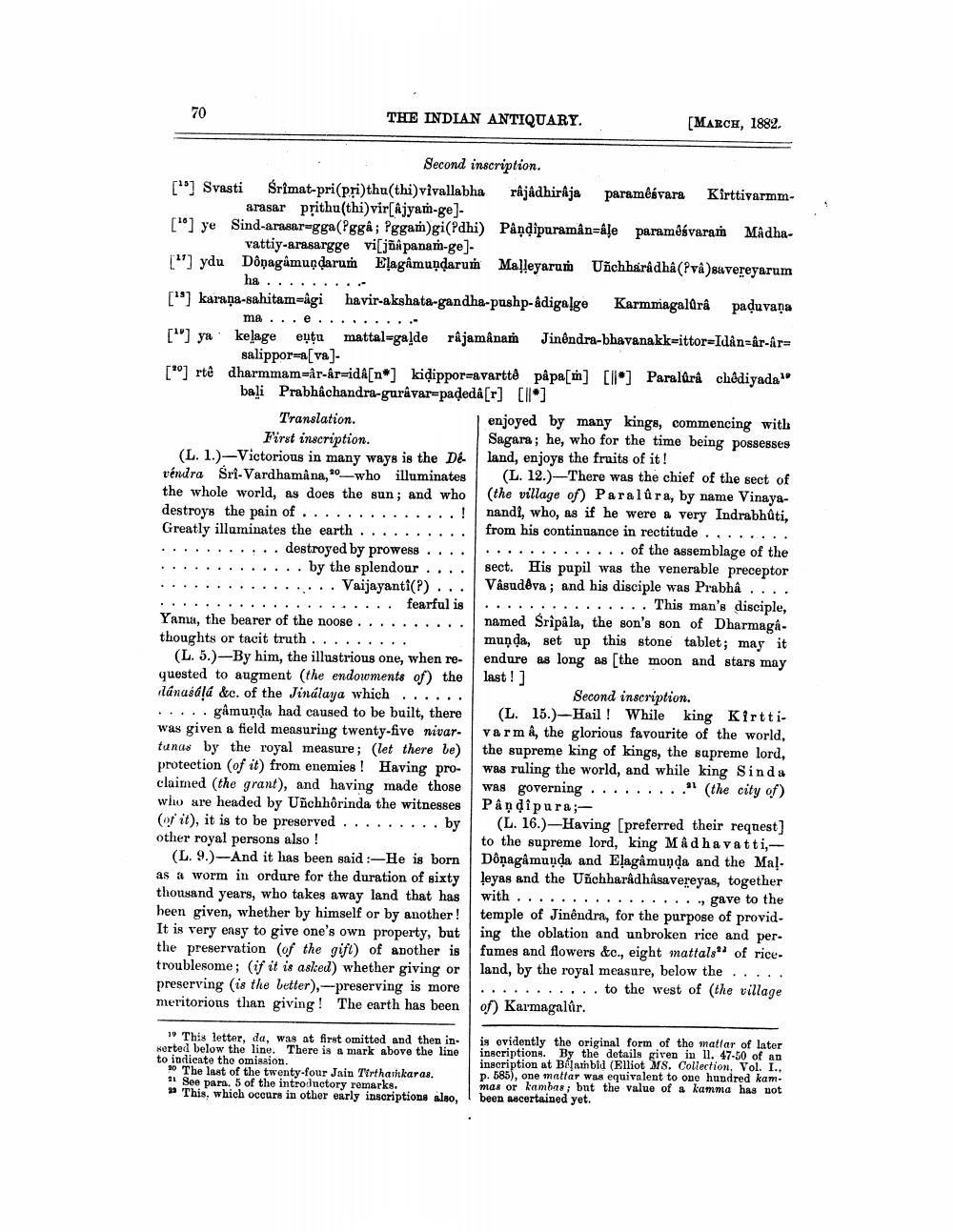________________
70
THE INDIAN ANTIQUARY.
Second inscription.
[] Svasti
Śrimat-pri(pri) thu (thi)vivallabha arasar prithu(thi) vir[ajyam-ge]
râjâdhiraja paramêśvara Kirttivarmm
[1] ye Sind-arasar-gga (Pggâ; Pggam)gi(Pdhi) Pândipuramân-âle paramêsvaram Madha
vattiy-arasargge vi[jñâpanam-ge]
ydu Dongimundaruh Elagimundarah Malleyarah Unchharidhi (vi)saveearum
ha..
[1] karana-sahitam-âgi havir-akshata-gandha-pushp-âdigalge
ma... e...
[] ya kelage entu mattal-galde rajamânam
.
Translation.
First inscription.
(L. 1.)-Victorious in many ways is the Dé véndra Sri-Vardhamâna, 20-who illuminates the whole world, as does the sun; and who destroys the pain of...
!
Greatly illuminates the earth
salippor=a[va]
[20] rtê dharmmam-âr-ar-idâ[n] kiḍippor-avartte påpa[m] [*] Paralûrâ chêdiyada
bali Prabhichandra-gurávar-padeda[r] [*]
destroyed by prowess by the splendour .. Vaijayanti(?)... fearful is
Yama, the bearer of the noose thoughts or tacit truth....
(L. 5.)-By him, the illustrious one, when requested to augment (the endowments of) the dánasálá &c. of the Jinalaya which
[MARCH, 1882.
... gâmunda had caused to be built, there was given a field measuring twenty-five nivartanas by the royal measure; (let there be) protection (of it) from enemies! Having proclaimed (the grant), and having made those who are headed by Uñchhôrinda the witnesses (of it), it is to be preserved..... by other royal persons also!
(L. 9.)-And it has been said:-He is born as a worm in ordure for the duration of sixty thousand years, who takes away land that has been given, whether by himself or by another! It is very easy to give one's own property, but the preservation (of the gift) of another is troublesome; (if it is asked) whether giving or preserving (is the better),-preserving is more meritorions than giving! The earth has been
19 This letter, da, was at first omitted and then inserted below the line. There is a mark above the line to indicate the omission.
20 The last of the twenty-four Jain Tirthankaras. 21 See para. 5 of the introductory remarks.
This, which occurs in other early inscriptions also,
Karmmagalurâ paduvana
Jinendra-bhavanakk=ittor-Idân-âr-âr=
enjoyed by many kings, commencing with Sagara; he, who for the time being possesses land, enjoys the fruits of it!
(L. 12.) There was the chief of the sect of (the village of) Paralûra, by name Vinayanandi, who, as if he were a very Indrabhuti, from his continuance in rectitude..
... of the assemblage of the sect. His pupil was the venerable preceptor Vasudeva; and his disciple was Prabhâ.... .. This man's disciple, named Śripâla, the son's son of Dharmagamunda, set up this stone tablet; may it endure as long as [the moon and stars may last!]
Second inscription.
(L. 15.)-Hail! While king Kirttivarm â, the glorious favourite of the world, the supreme king of kings, the supreme lord, was ruling the world, and while king Sinda was governing. (the city of) Pândipura;
21
(L. 16.)-Having [preferred their request] to the supreme lord, king Madhavatti,Dônagâmuuda and Elagâmunda and the Malleyas and the Uñchharâdhâsavereyas, together with. . . . gave to the temple of Jinêndra, for the purpose of providing the oblation and unbroken rice and perfumes and flowers &c., eight mattals of riceland, by the royal measure, below the . . . ... to the west of (the village of) Karmagalûr.
is evidently the original form of the mattar of later inscriptions. By the details given in 11. 47-50 of an inscription at Balambid (Elliot MS. Collection, Vol. I.. p. 585), one mattar was equivalent to one hundred kammas or kambas; but the value of a kamma has not been ascertained yet.




